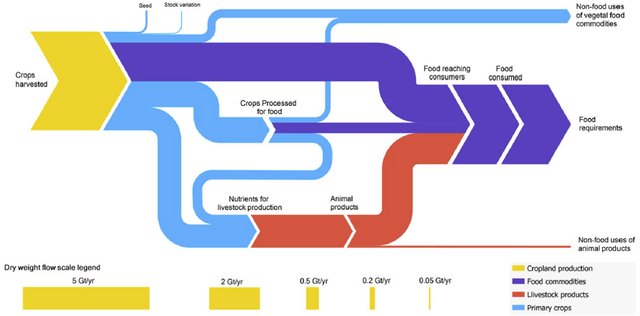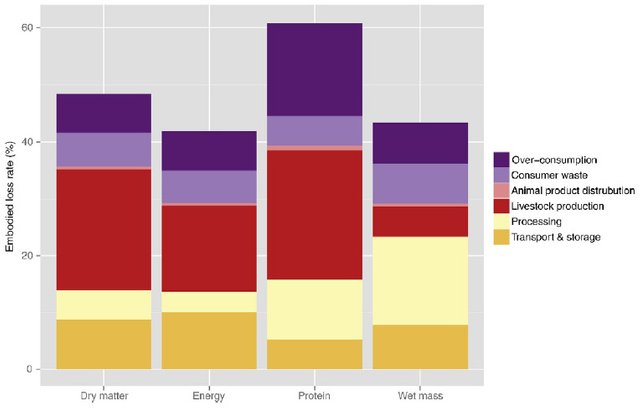Over-Eating and Waste Account for a 20% Loss to the World Food Supply
Trying to provide food for a society has its issues, such as inefficiencies and losses in agricultural production, processing, and up to the point of consumer purchasing. The sustainability of meeting the nutritional requirements of a growing population can be severely affected by these food losses and the costs that are incurred. Consumer behavior and their willingness to pay for certain food will affect what nutrition they end up getting.
A new study conducted by scientists at the University of Edinburgh, Rural College, University of York, Karlsruhe Institute of Technology and the Centre for Australian Weather and Climate Research, has published their findings in the journal Agricultural Systems. They examined 10 key stages of food production -- from growing, harvesting, up to the consumption -- in order to quantify what the food losses are. The main source of data is from the UN's Food and Agriculture Organization. The losses in global food production are higher than previously estimated.

Embodied harvested crops (without forage crops) through stages in food system in dry matter terms
Current food requirements are being surpassed in food production as the world population consumes about 10% more food than it needs (over-eating). An additional 9% is thrown away or left to spoil (wasted). This totals approximately 20% or 1/5 of the global food supply that is being wasted by being thrown away or overly consumed in our gluttonous pleasure trap. Reducing this loss could vastly improve global food security with more people having access to safe and affordable nutritious food.

Losses of harvested crops (excluding grassland and forage crop inputs to livestock
production) by stage in the food system, using embodied loss rates.
The study found that 50% (2.1 billion tonnes) of harvested crops are lost in over-consumption, consumer waste, and inefficient production. 1.8 billions tonnes of crops are used to feed animals to make 240 million tonnes of carcasses people want to consume thinking they "need" to, when we could plant more types of crops to feed humanity instead, and not need to kill animals who did us no harm. But we just want to keep doing what we did, and also keep increasing it! 100 years ago people were not consuming this amount of animal flesh on the planet compared to the plants they consumed. Animal slaughter amounts to killing over 50 billion land animals each year. We are stuck in the past mentality of survival where we ate animal products to survive due to a lack of agricultural supply, especially in winter. This process is the most inefficient with 78% or 840 million tonnes of losses, and accounts for 40% of all losses of harvested crops.
As the world continues to follow it's gluttony and pleasure trap of "meat tastes good", falsely thinking we "need" it, then sustaining a demand of growing crops to feed animals that we slaughter is not going to be possible. Increasing the crops fed to more animals, to then slaughter them, drastically decreases the efficiency of food production in all areas of growing, harvesting and processing of crops. A growing world population is not sustainable this way.
Trying to meet this unsustainable demand will produce more waste in the environment, gas emissions, and depleting water supply. I takes 100 times more water to produce one pound of beef protein compared to one pound of grain protein. The Food and Agriculture Association (FAO) says "livestock may well be the leading player in the reduction of biodiversity, since it is the major driver of deforestation, as well as one of the leading drivers of land degradation, pollution, climate change, overfishing, sedimentation of coastal areas and facilitation of invasions by alien species."
Eating plants, not over-eating beyond nutritional needs, and reducing the waste of food that is sold or purchased will help slow the growing trend of unsustainable growth.
Lead author of the study, Dr. Peter Alexander, said:
"Reducing losses from the global food system would improve food security and help prevent environmental harm. Until now, it was not known how over-eating impacts on the system. Not only is it harmful to health, we found that over-eating is bad for the environment and impairs food security."
Personally, I pretty much only use a compost for my garbage, and it's only for inedible parts of food. I don't waste much or add much to the regular non-biological garbage, since I also recycle most of the other things like packaging. I also only eat when I'm actually hungry, instead of just eating automatically according to scheduled times of the day that we are "supposed" to eat.
References:
- Fifth of world's food lost to over-eating and waste, study finds
- Peter Alexander, Calum Brown, Almut Arneth, John Finnigan, Dominic Moran, Mark D.A. Rounsevell. Losses, inefficiencies and waste in the global food system. Agricultural Systems, 2017; 153: 190 DOI: 10.1016/j.agsy.2017.01.014
If you appreciate and value the content, please consider:
Upvoting  , Sharing
, Sharing  or Reblogging
or Reblogging  below.
below.
Looking to contact me? Find me on Discord or send me a message on SteemKURE.
Please also consider supporting me as a Steem Witness by voting for me at the bottom of the Witness page; or just click on the upvote button if I am in the top 50:

2017-02-21, 5:02pm

This is some impressive numbers when they are crunched that way and we are not yet factoring in the quantity vs. quality aspect of the potential to feeding the entire world... Wow!
Overeating decreases our stomach enzymes as well, By the same token asking from the individual to eat more and creating a spiralling effect on the amount of foods apparently needed. Of course, on an economic level this quickly becomes overbearing for the individual, thus unsustainable, and, extrapolating to an entire population, a real problem leading to environmental decay, as points out the author quoted at the end of your excellent article.
Thanks for sharing with us all. The whole world would greatly gain by being aware of such matter. All for one and one for all! Namaste :)
In my country, someone started this
http://www.savefoodcutwaste.com/
This was another heartening news I saw last year.
http://www.tnp.sg/news/singapore/teaching-kids-not-waste-food
Another great article - thanks! I'm also promoting it and the two links from @lindal on my FB account.
Thanks ;)
Plus, we pay farmers not to grow crops, we also pay dead farmers -- the waste and inefficiency is unacceptable and really needs to be dealt with asap. In 2017 there is no reason for so many people to feel food insecure.
Interesting article. From what I understand there is plenty of food produced. It's just a matter of distribution.
Yes, that's on average across the globe. So since there are starving people, the over-eating gluttonous countries, like the West, consume a lot hehe. If we want to improve the quality of life for the planet, then we can better manage the food production to elevate the standard of living for everyone and ensure a more sustainable future for us all into the future.
Distribution has to be thought of in terms of more than just transport. It includes things like logistics, storage, pest control, customs barriers, international tariffs, etc.
A solution I once saw suggested would be to use existing rail lines with refrigerated cars. Every stopping point, people can get food from the train, and/or add food to it. Obviously, this is not going to work everywhere, and has certain problems, but it bears consideration...
@KrNel, your post has been chosen by @STEEMNEWS.ONLINE as one of today's promoted posts for its excellent content. We've upvoted, resteemed and published it through Facebook & Twitter.
As the author of a SNO featured article, you've been awarded one TRAIL coin. Please stop by the SteemTrail Discord server to learn more about how to claim your TRAIL coin. You will need an Open Ledger account to do so.
STEEMNEWS.ONLINE is the @SteemTrail for #news and watches the #steemnews tag most closely. Please consider supporting excellent news articles by making steemnews.online one of your operators on Streemian, in addition to steemtrail.
Thank you for your hard work and contribution of excellent content to Steemit.

If you would rather not be promoted by STEEMNEWS.ONLINE, please inform us by replying to this comment and we will honor your request.
This is a really awesome post @krnel. I have a hard time believing that
In the states I believe it is way more than that. The amount of food wasted by one store in one day is incredibly astounding, and inconceivable that more effort is not made to get this food to those in need. Those supporting GMOs use "greater production" as one of the points on their platform. RIDICULOUS AND LUDICROUS, as is shown by the information you present.
At the @gardenofeden we pass on boxes and boxes of excess food on to homeless and families in need. We feed our animals that which is not prime for human consumption (on which they thrive and which keeps us from purchasing processed food through the corporate world) -- Just a little taste of the things we do to help bridge the gap. Composting, reusing/repurposing (even better than recycling), making vinegars (food grade and cleaning grade) and wine, fermenting vegetables, dehydration, canning and paying it forward are ways we can all help with just the food waste. (Other waste is a whole different discussion in and of itself.)
Not to mention awareness and honor of our own personal consumption. Most people don't feel that their own habits make much of a difference in the grand scheme of things, but if we each take responsibility for our own part, things would drastically change. I just imagine the manager of each store actually taking steps to get the useable excess food to those in need. That alone would be a blessing. Until people stand up for what is beneficial to life instead of what is seemingly beneficial to the pocketbook, the devastation of the statistics you share is likely to grow.
Thank you @krnel for continuing to bring valuable awareness to this Steemit community. Upvoted and resteemed. Great job.